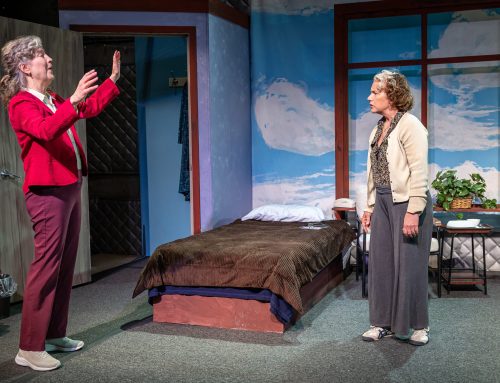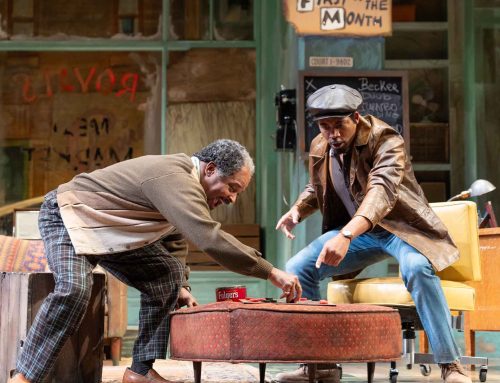at the Oregon Shakespeare Festival

Oh, damn! Another performance ranking Production: Good, Play: Awful.
I was happily anticipating this Depression Era play directed by the same Libby Appel who resurrected A View from the Bridge and provided an important and satisfying show last year.
That Arthur Miller “period piece” was heartbreakingly current.
Unhappily, this year’s model resonates with 2009 with shared bad economic times, but it clunks down the street alone with Odets’ polemics and immutable characters.
The winning philosophical views of life in Paradise are those of an embittered communist-sounding furnace repairman, Mr. Pike played by Mark Murphey, and the budding gangster Kewpie (Mark Bedard). These are the two whose world views prevail at the end of the play. Kewpie is an action guy, and so Odet gives Pike the coherent, detailed, eyes-open commentary on the state of the world.
And the state of Pike’s and Odet’s world is grim, grim, grim. One-dimensional, simplistic, revolutionary, grindingly grim. Worse, everything that happens in the play reinforces and proves the correctness of the bleakness.
Still worse, Odet wrote this polemic in the 30’s only to renounce his politics and name names during the 1950’s Communist witch hunts. So, not only are we listening to dated “The Decay of Capitalism” crap, it’s crap which the author himself later disowned. It would have been a kindness to kill this play at the when the revolutionary spirit of the playwright died.
Yeah, I will also admit that part of my unhappiness with Paradise is that some part of me wants a happy — or at least hopeful — ending. Spolier alert! You won’t even get a possibility of an uplifting breeze at the end of this puppy.
So, what’s to like in this Paradise? The set, the clothes, and most of the acting.
The grand front rooms set of factory owner Leo Gordon (Michael Hume) and wife Clara Gordon (Linda Alper) is a substantial, flexible backdrop for the action. We loved the details which included external entryways which you see in the wings on your way to your theater seats. The upstairs landing giving daughter Pearl (Elisa Bocanegra) and neighbors Sam and Bertha Katz (Tony DeBruno and Eileen DeSandre) their separate spaces was an inspired device to both tie together and distance those characters and their stories. Scenic Designer Marjorie Bradley Kellogg’s product was clever and comfortable all the way from the backstage drapes to the upstage dining table. I had trouble with the scarred and pockmarked 1930’s radio — it was supposed to be a newer model in the play and not something pulled from an antique store — but for the most part the set did its job extremely well.
I loved the class-conscious clothes! Each person wore suits, work clothes, and even motorcycle riding duds exactly matching their dialog and character. Kewpie’s metamorphosis from cabbie into a full-fledged gangster was particularly enjoyable to watch: his cheap driver’s outfit gave way to increasingly flashy suits until there were no more feathers to paste on that peacock. Brilliant!
Tony DeBruno turned in another excellent controlled performance as a bombastic s.o.b. His insecure nastiness was complete and icky, but he was no cut-out caricature.
Michael Hume gave Leo Gordon’s sponge personality life and believability. Written as a universal doormat, Hume provided warmth and rationale to Leo.
Mark Murphey remains the king of the lean and hungry look as he delivered the party-line speeches of Mr. Pike. Murphey’s trembling hands and little twitchy reactions kept his monotonous negativity from sounding artificial. A miracle, when I think about it.
Richard Elmore playing Gus Michaels was also splendid character. Elmore was interesting in each of his scenes.
Mark Bedard’s Kewpie did a fine job of growing into his inner gangster. Aggressively certain and conflicted at the same time. A self-interested ass with a frightened heart of the little neighborhood boy.
Daniel Marmion as the ill son Julie wandered appropriately throughout the house. His dying idiot savant persona was acceptable as possible.
Good performances, too, from Robert Vincent Frank (Rogo and Paul), Sarah Rutan (Libby Michaels), Bill Geisslinger (Foley), David DeSantos (Ben Gordon), and David Salsa (Felix, Williams).
The normally terrific Linda Alper disappointed me as Clara. She was over-the-top melodramatic to the point of comedy in her frenetic moments. Her generic ethnic mother role and its accent are wearing thin, although the scene with her trimming her dying son’s toenails was funny and touching.
Eileen DeSandre as Berta Katz also brought too much of her past roles as a comic maid into her character. She used her trademark hesitating comedic shuffle too much in her early scenes so that by the time she turns in some really good lines I’d already written her off as a buffoon.
And, folks! Something should be done about Alper’s and DeSandre’s make-up, especially in Act I. There’s an over made-up beige-green hue on their powdery faces which made me initially think Paradise was a spin off from the Addams Family TV show. The script also calls for an obvious wig on DeSandre, but the black thing she wore was unbelievably awful for a business-owner’s wife. Paradise isn’t a farce, so why these looks made it on stage is a mystery to me.
Define Paradise Lost: a play selection failure. A disappointing use of design, direction, and acting talent.
Ozdachs Rating: ![]()





Leave A Comment